Examining the History of Black Americans in the USA
VerifiedAdded on 2022/09/08
|5
|1162
|18
Essay
AI Summary
This essay delves into the history of Black people in America, beginning with the arrival of Africans in the 17th century and tracing the evolution of the African-American experience. It discusses the transatlantic slave trade, the origins of African Americans from various ethnic groups, and the early presence of Africans in the British colonies. The essay examines the legacy of slavery, including financial debt and racial inequality, and highlights the ongoing debate over reparations. It also touches upon the impact of voter suppression, the increasing diversity of the American population, and the blurring of racial and ethnic distinctions. The essay concludes by considering demographic forecasts and the changing landscape of racial and ethnic identity in the United States, referencing relevant academic sources and studies.
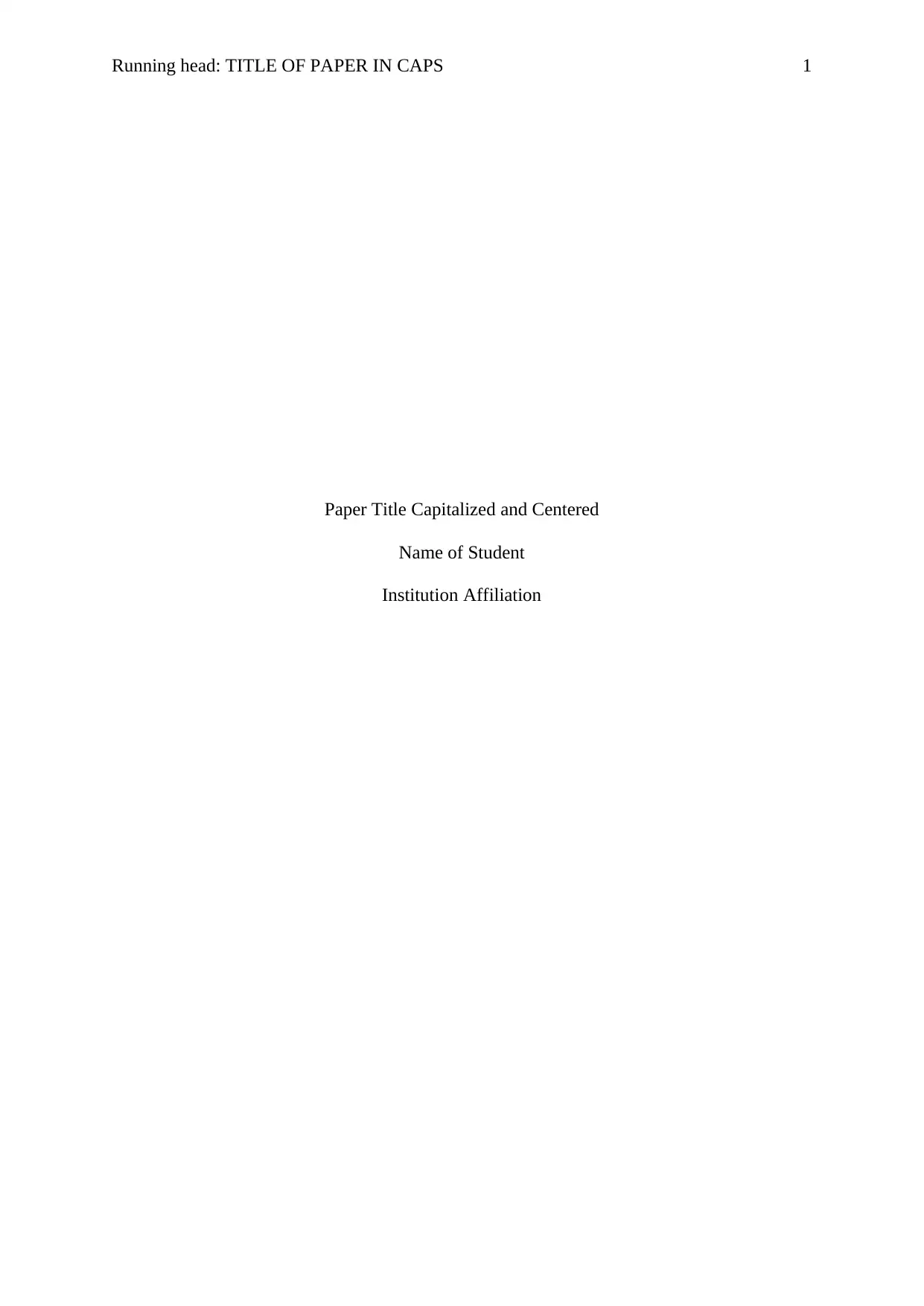
Running head: TITLE OF PAPER IN CAPS 1
Paper Title Capitalized and Centered
Name of Student
Institution Affiliation
Paper Title Capitalized and Centered
Name of Student
Institution Affiliation
Paraphrase This Document
Need a fresh take? Get an instant paraphrase of this document with our AI Paraphraser
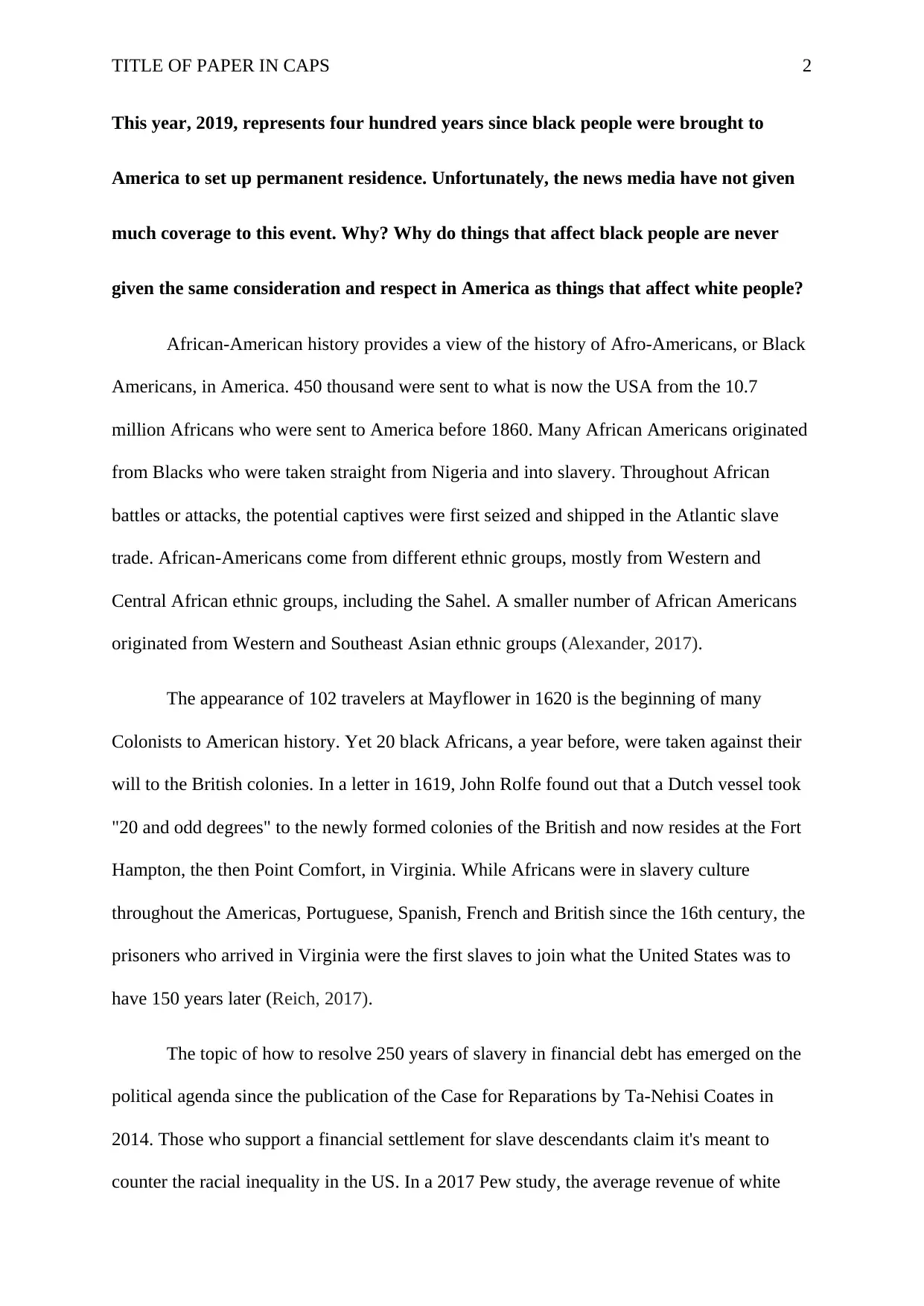
TITLE OF PAPER IN CAPS 2
This year, 2019, represents four hundred years since black people were brought to
America to set up permanent residence. Unfortunately, the news media have not given
much coverage to this event. Why? Why do things that affect black people are never
given the same consideration and respect in America as things that affect white people?
African-American history provides a view of the history of Afro-Americans, or Black
Americans, in America. 450 thousand were sent to what is now the USA from the 10.7
million Africans who were sent to America before 1860. Many African Americans originated
from Blacks who were taken straight from Nigeria and into slavery. Throughout African
battles or attacks, the potential captives were first seized and shipped in the Atlantic slave
trade. African-Americans come from different ethnic groups, mostly from Western and
Central African ethnic groups, including the Sahel. A smaller number of African Americans
originated from Western and Southeast Asian ethnic groups (Alexander, 2017).
The appearance of 102 travelers at Mayflower in 1620 is the beginning of many
Colonists to American history. Yet 20 black Africans, a year before, were taken against their
will to the British colonies. In a letter in 1619, John Rolfe found out that a Dutch vessel took
"20 and odd degrees" to the newly formed colonies of the British and now resides at the Fort
Hampton, the then Point Comfort, in Virginia. While Africans were in slavery culture
throughout the Americas, Portuguese, Spanish, French and British since the 16th century, the
prisoners who arrived in Virginia were the first slaves to join what the United States was to
have 150 years later (Reich, 2017).
The topic of how to resolve 250 years of slavery in financial debt has emerged on the
political agenda since the publication of the Case for Reparations by Ta-Nehisi Coates in
2014. Those who support a financial settlement for slave descendants claim it's meant to
counter the racial inequality in the US. In a 2017 Pew study, the average revenue of white
This year, 2019, represents four hundred years since black people were brought to
America to set up permanent residence. Unfortunately, the news media have not given
much coverage to this event. Why? Why do things that affect black people are never
given the same consideration and respect in America as things that affect white people?
African-American history provides a view of the history of Afro-Americans, or Black
Americans, in America. 450 thousand were sent to what is now the USA from the 10.7
million Africans who were sent to America before 1860. Many African Americans originated
from Blacks who were taken straight from Nigeria and into slavery. Throughout African
battles or attacks, the potential captives were first seized and shipped in the Atlantic slave
trade. African-Americans come from different ethnic groups, mostly from Western and
Central African ethnic groups, including the Sahel. A smaller number of African Americans
originated from Western and Southeast Asian ethnic groups (Alexander, 2017).
The appearance of 102 travelers at Mayflower in 1620 is the beginning of many
Colonists to American history. Yet 20 black Africans, a year before, were taken against their
will to the British colonies. In a letter in 1619, John Rolfe found out that a Dutch vessel took
"20 and odd degrees" to the newly formed colonies of the British and now resides at the Fort
Hampton, the then Point Comfort, in Virginia. While Africans were in slavery culture
throughout the Americas, Portuguese, Spanish, French and British since the 16th century, the
prisoners who arrived in Virginia were the first slaves to join what the United States was to
have 150 years later (Reich, 2017).
The topic of how to resolve 250 years of slavery in financial debt has emerged on the
political agenda since the publication of the Case for Reparations by Ta-Nehisi Coates in
2014. Those who support a financial settlement for slave descendants claim it's meant to
counter the racial inequality in the US. In a 2017 Pew study, the average revenue of white
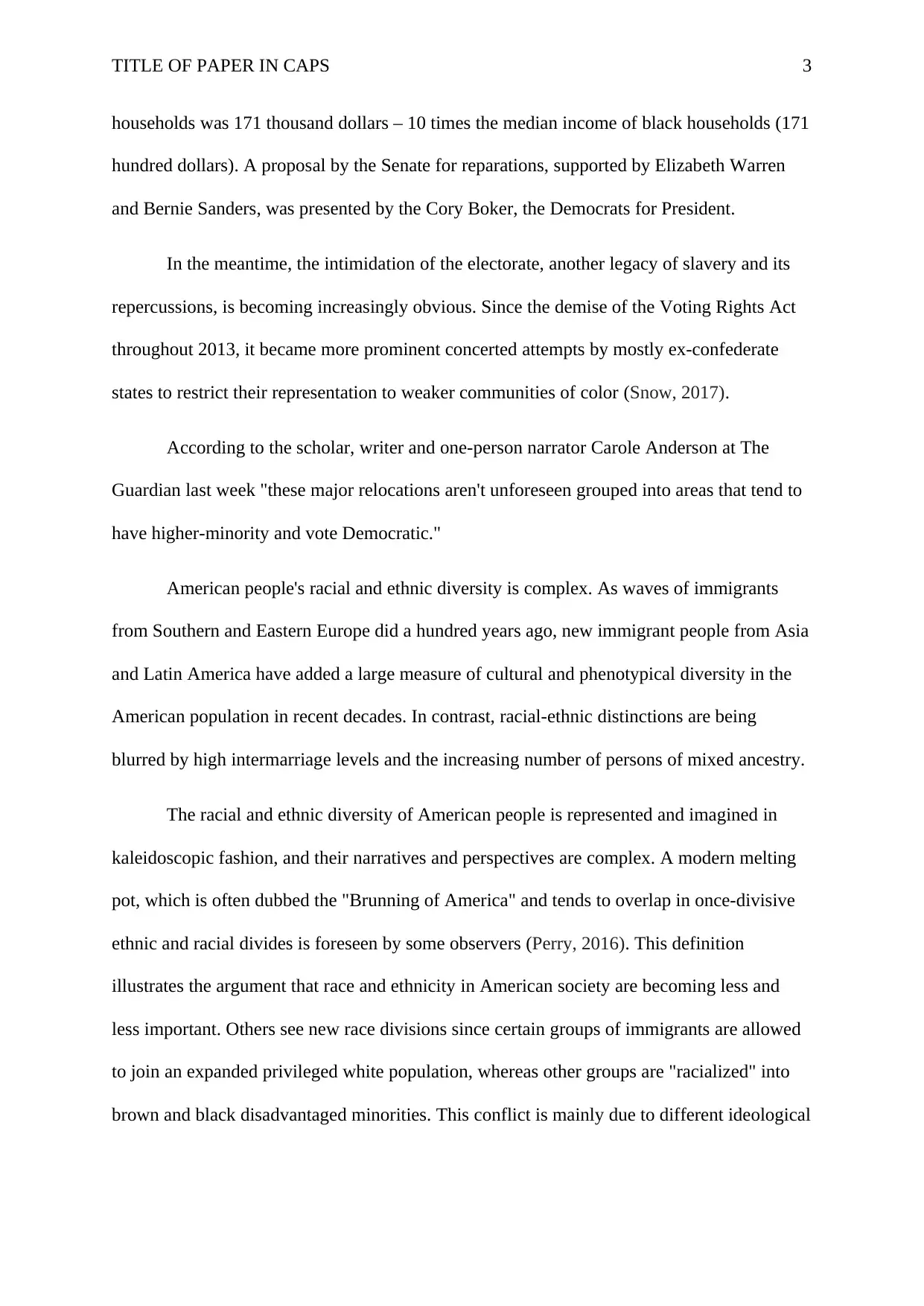
TITLE OF PAPER IN CAPS 3
households was 171 thousand dollars – 10 times the median income of black households (171
hundred dollars). A proposal by the Senate for reparations, supported by Elizabeth Warren
and Bernie Sanders, was presented by the Cory Boker, the Democrats for President.
In the meantime, the intimidation of the electorate, another legacy of slavery and its
repercussions, is becoming increasingly obvious. Since the demise of the Voting Rights Act
throughout 2013, it became more prominent concerted attempts by mostly ex-confederate
states to restrict their representation to weaker communities of color (Snow, 2017).
According to the scholar, writer and one-person narrator Carole Anderson at The
Guardian last week "these major relocations aren't unforeseen grouped into areas that tend to
have higher-minority and vote Democratic."
American people's racial and ethnic diversity is complex. As waves of immigrants
from Southern and Eastern Europe did a hundred years ago, new immigrant people from Asia
and Latin America have added a large measure of cultural and phenotypical diversity in the
American population in recent decades. In contrast, racial-ethnic distinctions are being
blurred by high intermarriage levels and the increasing number of persons of mixed ancestry.
The racial and ethnic diversity of American people is represented and imagined in
kaleidoscopic fashion, and their narratives and perspectives are complex. A modern melting
pot, which is often dubbed the "Brunning of America" and tends to overlap in once-divisive
ethnic and racial divides is foreseen by some observers (Perry, 2016). This definition
illustrates the argument that race and ethnicity in American society are becoming less and
less important. Others see new race divisions since certain groups of immigrants are allowed
to join an expanded privileged white population, whereas other groups are "racialized" into
brown and black disadvantaged minorities. This conflict is mainly due to different ideological
households was 171 thousand dollars – 10 times the median income of black households (171
hundred dollars). A proposal by the Senate for reparations, supported by Elizabeth Warren
and Bernie Sanders, was presented by the Cory Boker, the Democrats for President.
In the meantime, the intimidation of the electorate, another legacy of slavery and its
repercussions, is becoming increasingly obvious. Since the demise of the Voting Rights Act
throughout 2013, it became more prominent concerted attempts by mostly ex-confederate
states to restrict their representation to weaker communities of color (Snow, 2017).
According to the scholar, writer and one-person narrator Carole Anderson at The
Guardian last week "these major relocations aren't unforeseen grouped into areas that tend to
have higher-minority and vote Democratic."
American people's racial and ethnic diversity is complex. As waves of immigrants
from Southern and Eastern Europe did a hundred years ago, new immigrant people from Asia
and Latin America have added a large measure of cultural and phenotypical diversity in the
American population in recent decades. In contrast, racial-ethnic distinctions are being
blurred by high intermarriage levels and the increasing number of persons of mixed ancestry.
The racial and ethnic diversity of American people is represented and imagined in
kaleidoscopic fashion, and their narratives and perspectives are complex. A modern melting
pot, which is often dubbed the "Brunning of America" and tends to overlap in once-divisive
ethnic and racial divides is foreseen by some observers (Perry, 2016). This definition
illustrates the argument that race and ethnicity in American society are becoming less and
less important. Others see new race divisions since certain groups of immigrants are allowed
to join an expanded privileged white population, whereas other groups are "racialized" into
brown and black disadvantaged minorities. This conflict is mainly due to different ideological
⊘ This is a preview!⊘
Do you want full access?
Subscribe today to unlock all pages.

Trusted by 1+ million students worldwide
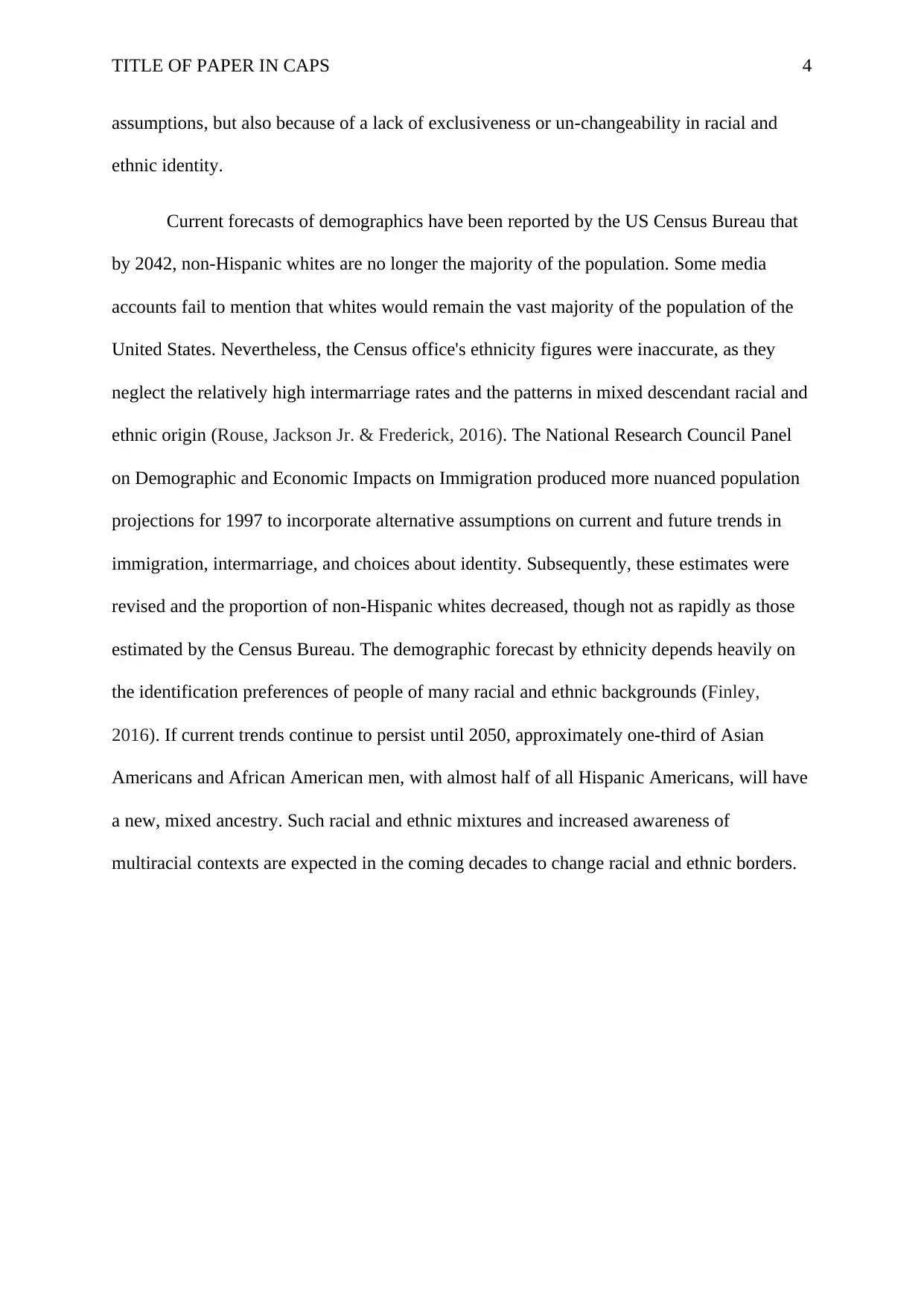
TITLE OF PAPER IN CAPS 4
assumptions, but also because of a lack of exclusiveness or un-changeability in racial and
ethnic identity.
Current forecasts of demographics have been reported by the US Census Bureau that
by 2042, non-Hispanic whites are no longer the majority of the population. Some media
accounts fail to mention that whites would remain the vast majority of the population of the
United States. Nevertheless, the Census office's ethnicity figures were inaccurate, as they
neglect the relatively high intermarriage rates and the patterns in mixed descendant racial and
ethnic origin (Rouse, Jackson Jr. & Frederick, 2016). The National Research Council Panel
on Demographic and Economic Impacts on Immigration produced more nuanced population
projections for 1997 to incorporate alternative assumptions on current and future trends in
immigration, intermarriage, and choices about identity. Subsequently, these estimates were
revised and the proportion of non-Hispanic whites decreased, though not as rapidly as those
estimated by the Census Bureau. The demographic forecast by ethnicity depends heavily on
the identification preferences of people of many racial and ethnic backgrounds (Finley,
2016). If current trends continue to persist until 2050, approximately one-third of Asian
Americans and African American men, with almost half of all Hispanic Americans, will have
a new, mixed ancestry. Such racial and ethnic mixtures and increased awareness of
multiracial contexts are expected in the coming decades to change racial and ethnic borders.
assumptions, but also because of a lack of exclusiveness or un-changeability in racial and
ethnic identity.
Current forecasts of demographics have been reported by the US Census Bureau that
by 2042, non-Hispanic whites are no longer the majority of the population. Some media
accounts fail to mention that whites would remain the vast majority of the population of the
United States. Nevertheless, the Census office's ethnicity figures were inaccurate, as they
neglect the relatively high intermarriage rates and the patterns in mixed descendant racial and
ethnic origin (Rouse, Jackson Jr. & Frederick, 2016). The National Research Council Panel
on Demographic and Economic Impacts on Immigration produced more nuanced population
projections for 1997 to incorporate alternative assumptions on current and future trends in
immigration, intermarriage, and choices about identity. Subsequently, these estimates were
revised and the proportion of non-Hispanic whites decreased, though not as rapidly as those
estimated by the Census Bureau. The demographic forecast by ethnicity depends heavily on
the identification preferences of people of many racial and ethnic backgrounds (Finley,
2016). If current trends continue to persist until 2050, approximately one-third of Asian
Americans and African American men, with almost half of all Hispanic Americans, will have
a new, mixed ancestry. Such racial and ethnic mixtures and increased awareness of
multiracial contexts are expected in the coming decades to change racial and ethnic borders.
Paraphrase This Document
Need a fresh take? Get an instant paraphrase of this document with our AI Paraphraser
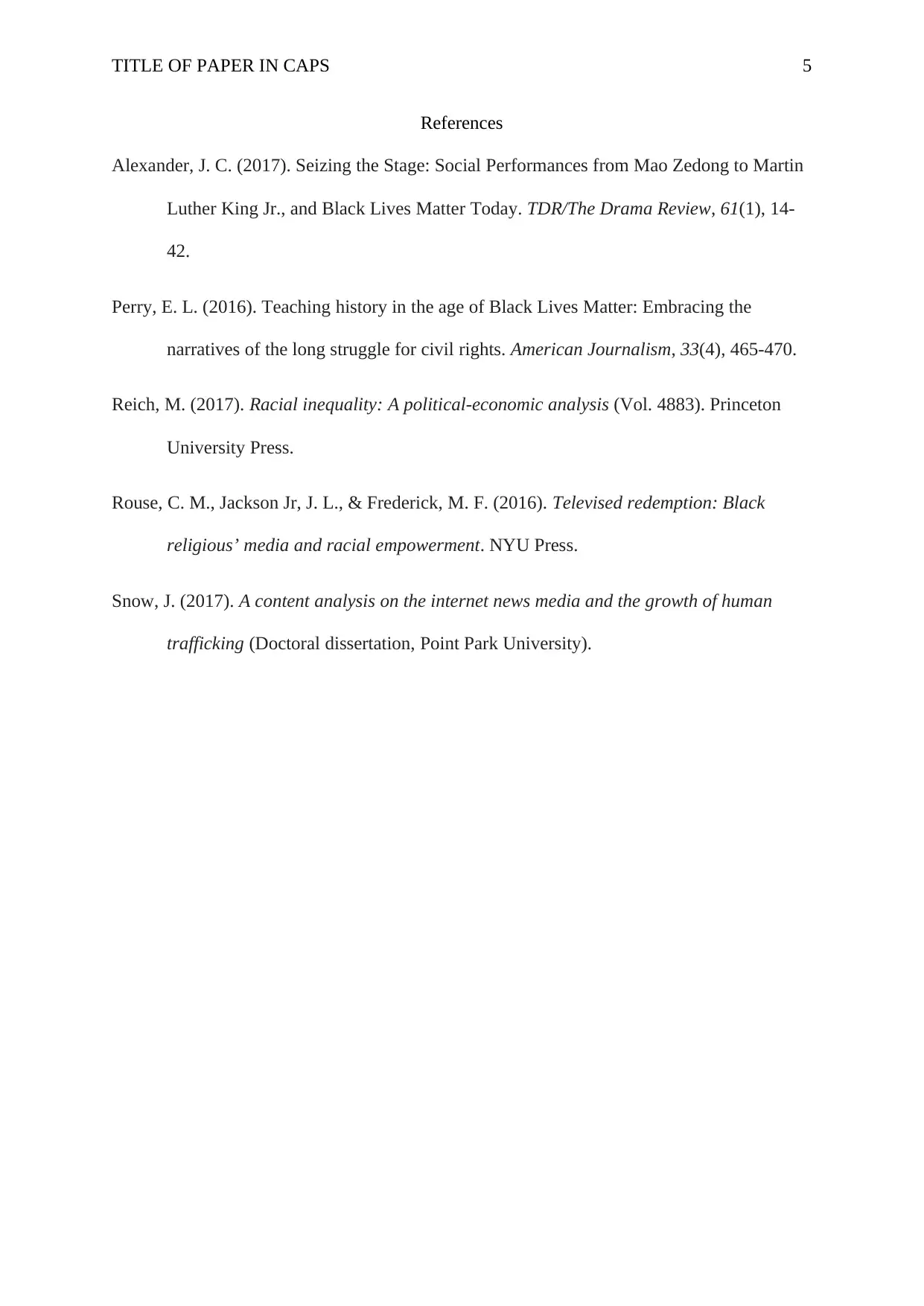
TITLE OF PAPER IN CAPS 5
References
Alexander, J. C. (2017). Seizing the Stage: Social Performances from Mao Zedong to Martin
Luther King Jr., and Black Lives Matter Today. TDR/The Drama Review, 61(1), 14-
42.
Perry, E. L. (2016). Teaching history in the age of Black Lives Matter: Embracing the
narratives of the long struggle for civil rights. American Journalism, 33(4), 465-470.
Reich, M. (2017). Racial inequality: A political-economic analysis (Vol. 4883). Princeton
University Press.
Rouse, C. M., Jackson Jr, J. L., & Frederick, M. F. (2016). Televised redemption: Black
religious’ media and racial empowerment. NYU Press.
Snow, J. (2017). A content analysis on the internet news media and the growth of human
trafficking (Doctoral dissertation, Point Park University).
References
Alexander, J. C. (2017). Seizing the Stage: Social Performances from Mao Zedong to Martin
Luther King Jr., and Black Lives Matter Today. TDR/The Drama Review, 61(1), 14-
42.
Perry, E. L. (2016). Teaching history in the age of Black Lives Matter: Embracing the
narratives of the long struggle for civil rights. American Journalism, 33(4), 465-470.
Reich, M. (2017). Racial inequality: A political-economic analysis (Vol. 4883). Princeton
University Press.
Rouse, C. M., Jackson Jr, J. L., & Frederick, M. F. (2016). Televised redemption: Black
religious’ media and racial empowerment. NYU Press.
Snow, J. (2017). A content analysis on the internet news media and the growth of human
trafficking (Doctoral dissertation, Point Park University).
1 out of 5
Related Documents
Your All-in-One AI-Powered Toolkit for Academic Success.
+13062052269
info@desklib.com
Available 24*7 on WhatsApp / Email
![[object Object]](/_next/static/media/star-bottom.7253800d.svg)
Unlock your academic potential
Copyright © 2020–2026 A2Z Services. All Rights Reserved. Developed and managed by ZUCOL.





